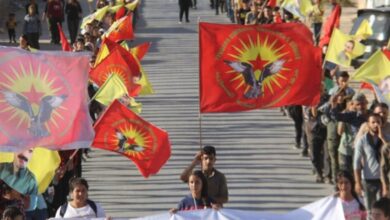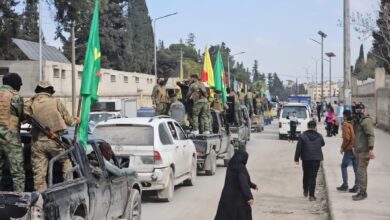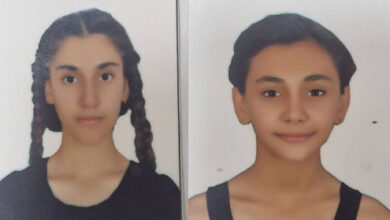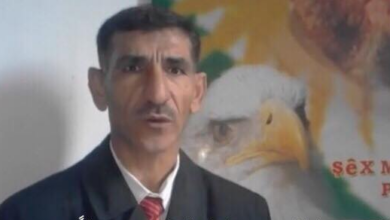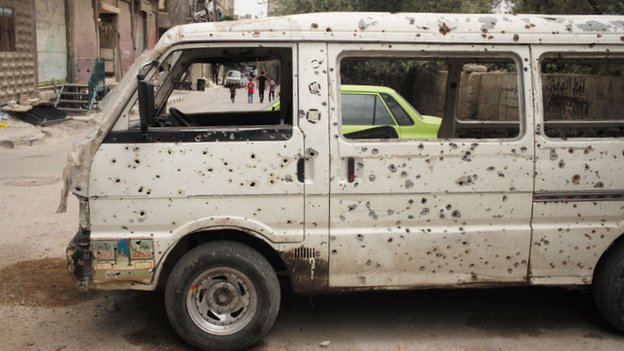
Syria conflict: Defiance inside Damascus rebel suburb
In the Syrian capital, Damascus, the three-year war continues unabated, with government forces trading fire with fighters in the suburbs. In his second exclusive report, the BBC’s Middle East editor Jeremy Bowen crosses into Qaboun, a rebel-held district on the fringes, battle-scarred but still defiant.
In Damascus, two worlds exist very close to each other. One belongs to President Bashar al-Assad and his supporters. The other, in narrow streets and blasted buildings, is where the rebels fight on.
The BBC team travelled from central Damascus to Qaboun, a typical poor suburb on the edge of the capital. It is only about a 20-minute drive.
Fighters from various local opposition militias started appearing openly on the streets of the capital early in 2012. It was one of the regime’s lowest points, as rebels seized sections of Ghouta, the belt of suburbs and satellite towns on the city’s perimeter.
In some of the suburbs now, there are local ceasefires. The Syrian army was strong enough to stop the rebels breaking through into central Damascus, but not strong enough to push back into areas which are often a tangled maze of alleys and rubble. So local truce agreements have been made.
In other places, the army has pushed the rebels back, mostly thanks to their overwhelming firepower.
Badly damaged
Qaboun has a fragile, informal ceasefire with the Syrian army, but no truce agreement yet. The fighters in Qaboun are loyal to the Free Syria Army.
Shelling has damaged almost every building. The mosque is wrecked, with a hole punched through the dome. Like all the poor Damascus suburbs, Qaboun expanded rapidly to absorb migrants from the countryside.
The unplanned streets, built out of unfinished concrete and cement blocks, are as narrow and as tangled as a medieval town in Europe.
My guide was Abu Ammar, a man in his 30s with a beard, a leather shoulder holster and a posse of men who said they had known each other before what they called the revolution began.
As I was asking Abu Ammar about the state of the ceasefire, short bursts of machine-gun fire crackled around the alleyway from a position a couple of streets away. He looked towards the confrontation line.
“You can hear the shooting. Last night, they went crazy and tried to get in. There were some clashes, not big, and we kicked them out.”
Abu Ammar said his fight was with the president, not with Assad’s sect, the Alawites, which dominates the regime.
“My wife is an Alawite. We want a state of justice and after that eventually to be like Turkey or Malaysia. We’d like the war to finish. We don’t like killing and we don’t want to be killed.”
‘Where else can we go?’
We stood in a battered street about 500ft (150 metres) from the Syrian army’s positions. A man stood outside his home with three small children. He did not want to give his name.
“Life’s very difficult here, not easy at all,” he said. “There’s shelling, mortars, shooting. It’s a very difficult life here. But where else can we go?
“This is our home, our country. We have no other place. God willing, the rebels are going to win. The regime is unjust and unfair. History shows that injustice doesn’t last.”
Qaboun has organised itself effectively. A network of surgical clinics are dispersed around the neighbourhood. An underground kitchen provides about 3,000 free meals every day.
When we were there, they were preparing bulgur wheat, stewed with tomatoes, stirring big pots simmering on gas rings with long two-handed spoons, like thin metal oars.
Abu Ammar and his men said they would fight on until Bashar al-Assad and the regime were kicked out.
‘Fight to the end’
Twenty minutes back towards the centre of Damascus, the president’s supporters were driving through the streets, waving Syrian flags, songs glorifying Bashar thumping from their sound systems.
In a much quieter, poor area – quite like Qaboun before it was badly damaged, but loyal to the Assads – a man aged 50, called Malek Khoudar, stood with some of the men of his neighbourhood at a checkpoint.
They were mostly middle-aged, all staunch Assad supporters, all wearing camouflage fatigues and carrying Kalashnikov assault rifles. Malek and his neighbours were in the National Defence Force, a sort of Home Guard.
He showed us a picture of his son, Wasim, who was killed fighting for the Syrian army 11 months ago at the age of 21, in one of the bitterly contested suburbs of Damascus.
He said that the rebels had tunnelled under a building where 42 soldiers were staying, detonated a bomb and killed all of them, including his son. The bodies, he said, were in still in the rubble as the army had not regained control of the area.
“God protect the Syrian army, we will continue fighting until the last drop of our blood, until finishing the last armed person in our country, we will keep on them and we will smash them.”
Assad resurgent?
Overall, President Assad has never been in a better position since the war started three years ago. His enemies dismissed his victory in the recent presidential election as a sham and a fraud.
But from the president’s point of view, it is an overwhelming victory; it unites his core supporters, men like Malek Khoudar. It also strengthens his position the next time diplomats from the big powers try to end the fighting.
The Geneva peace talks, which failed earlier this year, revolved around ways of getting the president to stand down to allow for a transition of power.
Now, whatever the outside world says about the poll, for President Assad’s people, it is proof that his place at the top is with the consent of the Syrian people.
Orphans and dirty water: Jeremy Bowen’s exclusive report from inside west Aleppo
www.bbc.com

